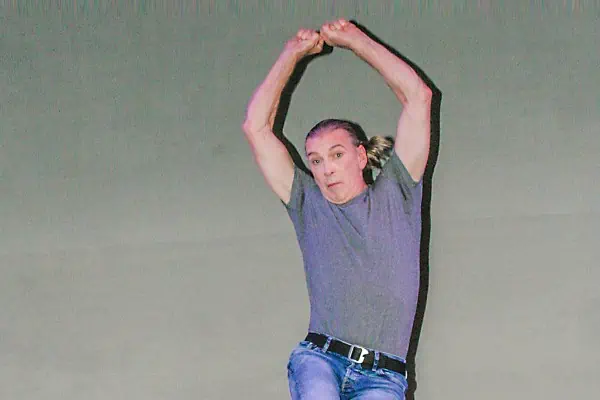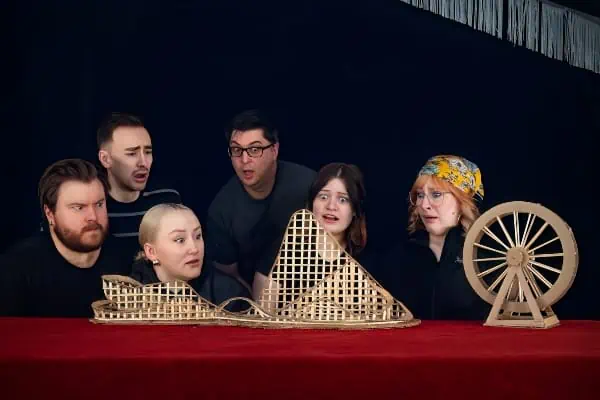Eric Epstein and I are sitting in the black box — the creative centre of the Guild Theatre — the room that can become anything, which has become everything.
He reflects back on his last 10 years with the Guild. As he steps out of the position, he recalls the first show he did in his first season as artistic director.
“It was October 2001. We did A Chorus of Disapproval. It was a play about community theatre. We built a false proscenium over there,” he points to what would be the front of the theatre space. He turns to me, “I started with a play that I loved — but to be honest, I wasn’t sure if we could pull it off.”
He emphasizes the “we” part.
As a new artistic director, Epstein had created a fantasy season as part of his interview for the position, not really thinking he might have to use that season right away. But when he was hired, he was asked to dive in. So he used that fantasy season to start off the next year.
About A Chorus of Disapproval, he says, “I wanted to direct it. It jokes about community theatre — in a good way. I thought it was a great way to start. It’s about small-town theatre, but it’s a challenging play — characters in the play are performing the Beggar’s Opera.
“I felt like my job as artistic director was to challenge myself and the resources of the community. I was tapping the strengths and limits of the community itself.”
Epstein had plenty of experience working in the community of Whitehorse. He’d been working for Frostbite, had been hired as the artistic director of the Yukon Arts Centre, and had directed several plays for the Guild already. He knew Whitehorse — and what it offered.
In 2001, he dove in using the contacts he had in town, the ideas he’d already planned, and crafted a season that was immediately interrupted by the events of 9/11.
“I didn’t plan that we would do the Accidental Death of an Anarchist as our second play, but we did put in some Bin Laden jokes.”
It’s not like you can plan for everything as artistic director. Some things are coincidence, some things sound as if they take a lot of sweat and angst.
Epstein is thoughtful when he’s talking about what it means to be an artistic director for the Guild. “It’s trying to second guess what people would like to perform, what they’d like to see performed, smaller plays vs. larger plays — how many experienced actors, how many plays that utilize a large cast so you can involve everyone.”
He knew there was an acting pool in town.
“But you always have people hiding out in Whitehorse who are incredible talent who show up one day for an audition,” he says. “And sometimes we have to make a late casting and then those plays are life-changing for whoever we drag in! They loved it so much that eventually, I think, we got three or four Guild presidents that way. They acted in their first play and it changed their lives.”
He says the biggest choice is choosing a director and he feels hiring professional directors helps everyone. “You want someone interested in the play, who can work well in community theatre. What we present to the audience is paramount.
“Because we fill that role of a regional theatre — as well as a community theatre. No one else is doing the range of repertoire.”
He lists off several plays, ones you’d expect from the canon — Beckett, Ibsen, as well as Flathers and other Canadian playwrights.
But he’s quick to acknowledge the contribution of theatre all over Whitehorse. “At one time, take the 1988-89 season, we had 18 shows running that season because we had five theatre companies in town.”
So there were a lot of offerings for people to go to.
This season has been a bit different with many of the major companies in development phases — Sour Brides, Nakai, Moving Parts, just to name a few. The Guild has been the only local company producing theatre this season.
Epstein is looking ahead to new projects.
He’d like to revive his own theatre company, the Whitehorse Theatre Ensemble, and do a show a year.
He’s still the artistic director at the Yukon Arts Centre, and he’d still like to do a few shows himself, opportunities he’s never had a chance to pursue.
“I have my eye on theatrical venues Outside.”
He has a desire to work in other professional environments and theatres, and he loves working with people who have made it their life’s work to be acting.
“I’d like to be the least-experienced person in the room.”
He’s looking forward to personal growth as an actor. “The vast majority of my life has been in the theatre, doing theatre, and I want to continue that.”
He admits there’s a little stress to being the artistic director of the Guild. “There’s something in every show that’s a little mountain to be climbed.”
Crises associated with every play tax the artistic director who often acts as the executive producer. “You’re ultimately responsible that the show goes on and goes on well.”
When he looks back, though, he feels very proud about what they’ve presented to the people of Whitehorse through his tenure as AD.
“Very few theatres of our size have done the blend we’ve done. We’ve even premiered a Yukon piece. We steered clear of crass commercialism. We’ve done very serious work that was well-received. We kept our edge.”
His smile just keeps growing. “I’m thrilled with all the people who’ve come out to be sound designers, set designers, costumers, stage managers — everyone.”
Sitting in the black box, looking around, Epstein says, “There’s a constant battle when you’re an artistic director, of seeing the glass as half full or half empty. Did we do enough? Did we do good work?”
He looks comfortably rumpled in the chair now, the same chairs the crowds come to sit in to see the Guild shows.
“Yeah, we could have done some things better, sure. But I think it’s been more about fullness.”




